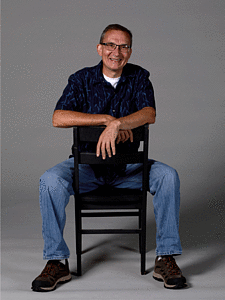Jeff Dintaman

About
Jeff earned his Bachelor of Arts in Theatre, Art, and Music from Western Oregon State College and received his Master of Fine Arts in Scene Design/Theatre Technology from the University of Portland. He teaches courses in stagecraft, design and theatre history and has taught special topics classes such as Puppetry and Play Writing. Jeff has designed over 30 productions at Luther, including The Mystery of Edwin Drood, Peer Gynt, and The Good Person of Szechwan. He has also directed plays such as The Marriage of Bette and Boo, The Hundred and First, and The Caucasian Chalk Circle.
Jeff also has worked with the Commonweal Theatre in Lanesboro, Minnesota and the Dorian Opera Theatre in Decorah where he has design shows such as Fiddler on the Roof, Groucho: A Life in Review, La Boheme and Measure for Measure.
During the 2003/2004 academic year, Jeff co-directed, with his wife Sue, Luther’s Nottingham Program, located at the Luther College Study Centre in Nottingham, England
THE 100 Production Practicum
An intensive experiental research ensemble devoted to crafting, creating, developing, and producing a faculty-directed theatre and/or dance event. Students in this course will be involved in research and theoretical discussion supporting active involvement in a collaborative process of performance, design and production management, such as director/designer assistant; set construction; lighting, sound, costume, properties, make-up/hair, and stage management.
THE 185 Theatre Laboratory
An introduction to the principles of production skills with lab practice in solo performance, group scene performances, design, technical theatre and production.
THE 104 Art of Illusion: Scenery and Properties
This course is designed to introduce students to the craft and skills used in creating scenic and properties illusions often found in theatre. Theatre is a collaborative art form with a variety of artists functioning together to create a single work. This course will explore the connection between the designer and the artist/craftsperson. Through field trips, readings, and experiential lab work students will develop, design, create and practice the art and craft of scenic and property illusionary skills. A field trip to a theatre production and an art museum will be a part of this course.
THE 127 Design I: Visual Principles
A study of the relationship between the performer, the elements of art, and the principles of design. Through a wide variety of hands-on exercises, students will explore how design can enhance the performer’s ability to express thoughts, emotions, and ideas. Areas of study will include the designer’s vocabulary and means of expression; the connection between design, the performer, and the audience; and methods of articulating visually to various audiences.
THE 204 Lighting Design
A study of lighting for the performing arts and an introduction to and practice in theatrical stage lighting. Coursework will cover the function of light in design; lighting equipment and terminology; communication graphics through practical laboratory explorations. Application of principles for performance events and contemporary lighting problems will be studied through extensive hands-on applications.
THE 300 Production Studio
An experiential collaborative component for the dance major. Set within a faculty-directed project or production, the student participates in research, dialogue, and the underpinnings of producing work.
THE 327 Design II: Scenography
An exploratory study of performance design: scenery, costuming, sound, and/or lighting. Coursework will develop a student’s individual approach to design and practical problem-solving for live performance with an emphasis on the function of design and aesthetics for the performing arts. Students enrolled will have bi-weekly portfolio meetings for an exchange of ideas in the field of design for live performance.
THE 351 Theatre History I
A study of major developments in the theatre – playwriting, acting, staging, architecture – from their roots through the 1850’s, with reading of numerous representative plays. A study of theatre around the world from primitive rituals to classical Greek and Roman, Indian, Chinese, Japanese, and African theatre and native performance. The plays, period developments, and movements studies will provide foundation for discussion of how modern readers and audiences can have a meaningful encounter with these ancient works.
- M.A., Scene Design/Theatre Technology, University Of Portland, 1990
- B.A., Theatre, Art, and Music, Western Oregon State College, 1984